
臺灣非營利專業書評媒體。Openbook編輯部將提供原生報導,文化觀察,人物採訪與國內外重大出版消息。 https://linktr.ee/openbooktaiwan
Identified with Literature I: From Language, Gender to Ethnic Group ft. Yang Jiaxian, Li Qinfeng, Apyang Imiq (Cheng Ting)
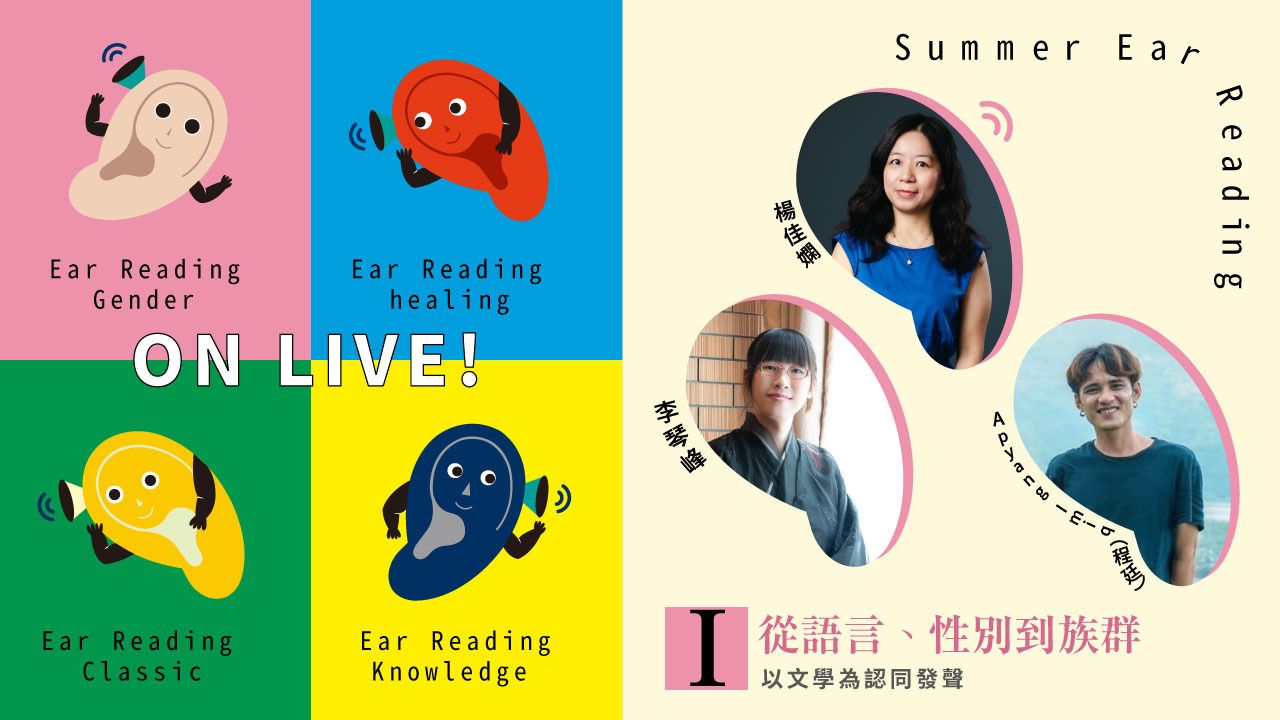
Moderator: Yang Jiaxian; Panelists: Li Qinfeng, Apyang Imiq (Cheng Ting)
Text finishing: Li Yikun, Chen Bojun
Yang Jiaxian: Hello everyone, I am today's host Yang Jiaxian. Welcome to the first event of the Summer Ear Reading Festival. Today's theme is gender, and the event is very special, because we are connected in three places, in addition to me in Taipei, there are Cheng Ting Apyang in Hualien, and Li Qinfeng in Tokyo.
Let me briefly introduce the three of us. I used to be more familiar with myself as a creator, and I was also teaching at the university. I appear on gender-related occasions, on the one hand because I recently compiled a cross-generational anthology of Taiwanese gay prose, "Thorns and Waves"; on the other hand, I have also been involved in gender movements for several years, although not on the streets However, I am the executive director of Taiwan's gender movement organization "Partner League", and I am very concerned about this issue. I study literature, and I am also particularly interested in gay literature and gay writing. Today, I am very honored to have a gender-related conversation with the two writers.
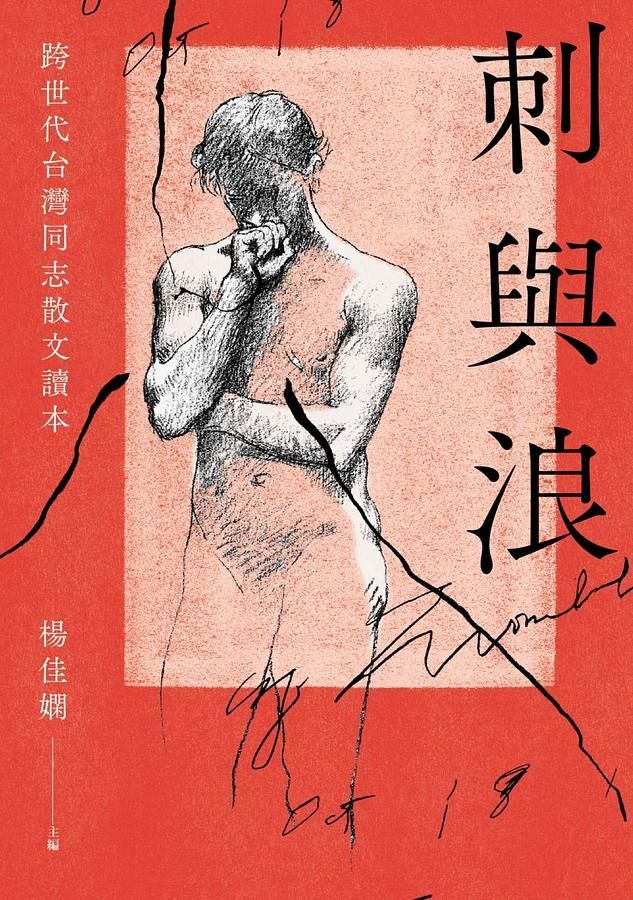
One of the guests today, Li Qinfeng, is a bilingual Chinese-Japanese writer and translator from Taiwan. She has lived in Japan since 2013 and has won several literary awards in Japan. I believe that friends who care about literature are very aware of it. Several of these works have been published in Taiwan. For example, you can listen to the reading version of "Solo Dance" on Jing Hao Ting, as well as "Countdown to the Five Seconds of the Crescent", "The Night When the North Star Falls", and "The Island of Blooming Flowers on the Other Side". Because Qinfeng is proficient in both Chinese and Japanese, she also translated the works of Akira Higashiyama, as well as Li Pingyao's "Plants to the Light", which may have been read by many people at the scene.
Another guest, Cheng Ting, Apyang, is from the Taroko ethnic group, and now lives in the Zhiyagan tribe in Hualien. He graduated from the Urban and Rural Institute of National Taiwan University. If you look up the author's profile from the blog, it is actually very interesting, because he is involved in a lot of community development and tribal affairs. I saw Apyang's profile and wanted to ask "Director General of the Tribal Simple Water Supply Committee" what does this position usually do? He is currently publishing a collection of essays called "I Grow in an Open Tree Hole", which writes about the experience of tribe and gender, and it is very interesting and opens our imagination to these issues.
Li Qinfeng: Hello everyone, my name is Li Qinfeng. I live in Tokyo now. Due to the epidemic and various factors, there is no way to go to Taiwan to meet you. The background of my video is a virtual background. This is a photo I took in Sydney in 2016 to participate in the Gay Pride event. Just because June is Global Gay Pride Month, I put this background on it. Please give me more advice.
Yang Jiaxian: Thank you Qinfeng. I believe that if online friends have read "Solo Dance", they should also remember that there are relevant passages from Sydney.
➤What is the Director General of the Tribal Simple Water Supply Committee doing?
Apyang: Hello everyone, my name is Apyang. I live in the Zhiyagan tribe in Wanrong Township, Hualien. I am very happy to participate in this activity. I hope you can ask any questions you have.
Yang Jiaxian: Can I ask the content of the work of "Director-General of the Tribal Simple Water Supply Committee"? I think it's super cool.
Apyang: Because in our tribe, many places are in the mountainous areas, and the general water company will not bring water up, nor will they help us deal with water problems. Therefore, our tribe has a committee to manage water, and every 3 years, we have to elect a chairman and so on. When I first came back to the tribe, everyone wanted to say that you could use a computer, so you went to be the director general, which was to handle administration, official documents, record, report and so on.
Yang Jiaxian: I think this experience is quite interesting. It is rare to see such a job appearing on the resumes of literary creators.
Today's dialogue, first of all, I hope to focus on the language and writing aspects of the two creations. Because Qin Feng's mother tongue is actually Chinese, but she mainly writes in Japanese in Japan. If you have read Apyang's book, you will know that he uses Chinese and ethnic languages interchangeably.
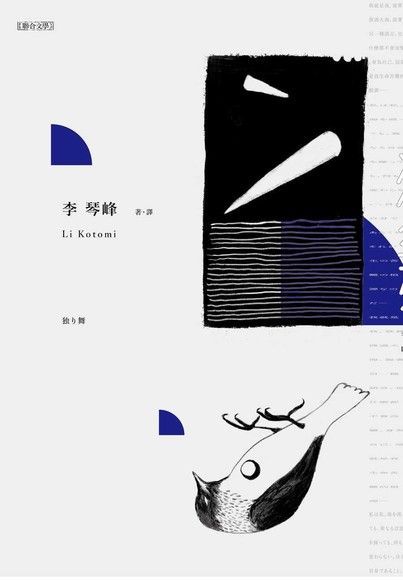
Qin Feng, we know that your first published "Solo Dance" was originally written in Japanese. Have you ever created works in Chinese? At what point did you decide to write in another language? What I find very interesting is, why do you want to write in a foreign language and enter the literary world of the foreign language in the first place, not the literary world of the mother tongue? In the use of literary creation, is there any key difference in the sense of language between Chinese and Japanese?
➤Writing in Japanese, the reason is that the postage is too expensive to send back to Taiwan? !
Li Qinfeng: I started trying to write when I was in the second year of the country, writing some novels and essays that may not be very decent. At that time, of course, I didn't know Japanese, and I couldn't write in English, so I could only write in my native language, which is Chinese. Therefore, in the process of my writing assignments, I basically use Chinese, mainly writing short stories and short essays.
In Taiwan, I didn't write anything too great. Later, I came to Japan because of the graduate school. At that time, my Japanese was already to a certain level. The graduate school was Japanese education, not learning Japanese, but learning how to teach Japanese. In addition, I live in Japanese all around me. I go to class, write reports, and write papers, all in Japanese. I saw a lot of international students from Taiwan in Japan. Everyone likes to get together. I don’t like this. I will try my best to integrate into Japanese society, maybe participate in local activities, and then meet Japanese friends. Nationality is not too big a barrier for me, and I naturally integrate into local life, and life is naturally Japanese.
In the reading part, if you have the impression, the Japanese yen really rose very expensively in 2011. It is not easy to buy Japanese documents in Taiwan, and it is very expensive. I'm a poor student and can't afford it. After arriving in Japan, it is easier to get Japanese books to read, such as Japanese novels and so on. After gradually accumulating reading experience, I gradually have some grasp of the writing style or tone of Japanese novels. Even so, I don't feel like I have the means to write in Japanese. When I was in graduate school, although I could write papers and reports in Japanese, it was still too difficult to write novels.
Why did you start writing in Japanese? It's actually a coincidence. The more realistic problem is that if I am in Japan, and then I write and contribute to Taiwan's literary awards in Chinese, the postage is too expensive.
It was by accident that I started taking pictures in Japanese. In 2016, I started working in a Japanese company as an office worker. It was April, when Japanese schools started, and the cherry blossoms were in full bloom. One morning, I was in the tram going to the company. It was the so-called full tram, which is very crowded. I saw the cherry blossoms blooming beautifully outside, and then I took the full tram by myself. Do you live like this? I don't know why, but suddenly a word appeared, "die", which is death in Japanese.
I remember that I was probably from adolescence, when I was in my teens, I always had a kind of faint, Japanese called "desire to die" (きしねんりょ), Chinese called "suicide desire" and so on, I feel like it is nothing to live significance. I have always had a thought about death in my heart, and at that time in April 2016, it emerged from my heart in Japanese.
Friends who have studied Japanese may know that "die ぬ" is a verb, full of special verbs. Among all the verbs in modern Japanese, only this word ends with ぬ. In fact, this is a coincidence other than satisfaction. I kept thinking about it that day, thinking that this might become the beginning of a novel, because the word appeared in Japanese at the beginning, so I thought it would be better to write it in Japanese, and it was "Solo Dance". Because the first article was written in Japanese, it was submitted to the Japanese literature award, and I was lucky enough to win a small award, and then I made my debut. After that, Man naturally kept writing in Japanese.
➤Kari, the Taroko language "chat" can sometimes be translated as "curry" (it's not
Yang Jiaxian: Thank you Qinfeng for sharing. Indeed, if you have "Solo Dance" at hand, you can turn to the first page, and the first word is "death".
Writers who write in foreign languages, such as Ha Jin, he has said that because he writes in the US in English, which is not the language he is most familiar with, he will tend to write in more concise, concise sentences, which will create a comparison A special, different style. If there is still time for this part, Qin Feng can also respond a little more.
Let's ask Apyang to talk about it first. How does learning ethnic languages help you in your literary creation? What are the different effects and meanings of adding ethnic languages and writing them all in Chinese or Chinese?
Apyang: I will add ethnic languages to my creations. Actually, I have several ideas. In the past, when I was reading the literary works of the aboriginal predecessors, the Roman alphabet was not so popular at that time, and they had to translate the ethnic language into Chinese characters for ordinary people to read. But the translation of some ethnic languages into Chinese characters is really strange, which has become a trouble for me in my creation. For example, my name Apyang, translated into Chinese is very strange.
Besides, the translation of ethnic languages actually has a lot of flexibility in literature, because I am not compiling a Taroko language dictionary. There are many word games that I think are very interesting in the conversion between the two languages. For example, in my work, it is said that the workhouse in the field is called Biyi , and I directly translate it into "Biyi". Or we talk about labor or field work called Qmpah . I think it has a lot of corresponding characters. I use the Chinese character for "ploughing", which just feels like going to work together. Then we have a word called Kari , which means language and chat. I have an essay about my story with the turkeys in the chicken coop when I was raising chickens. Because many chat situations are when eating, I directly translate it into Chinese "curry", which will become very interesting.
If some characters are hard to translate, or transliterated into Chinese characters, it is full of strange things. In addition to what I just said, because I am a creator myself, I have the space to convert the two languages. I also find it very interesting when I play with words. I can convey some of my ideas. Fun.
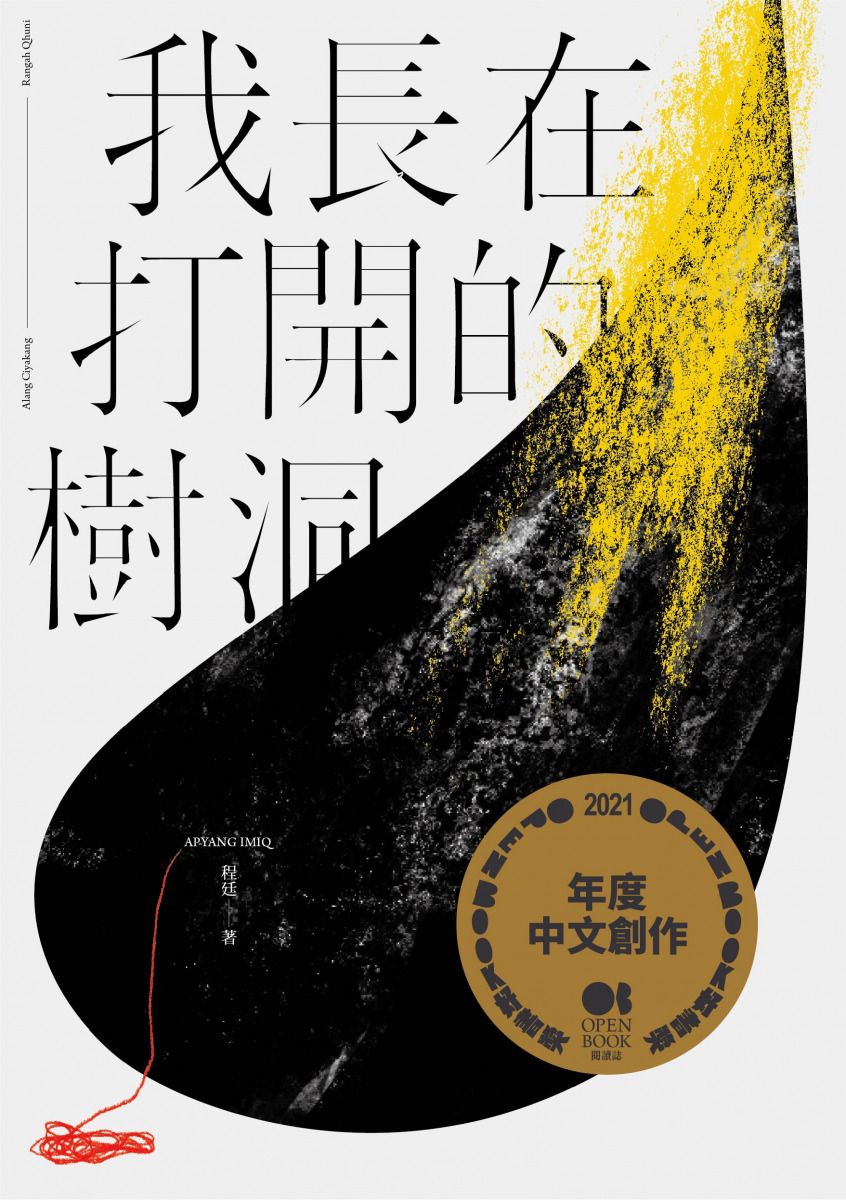
"I Grow in an Open Tree Hole" is my first creative collection. In fact, in today's tribe, not everyone can communicate in the whole family language or all Chinese. Many elderly people may speak ethnic languages well, but they do not speak Chinese as well as young people, so when they talk to us, they will be interspersed with ethnic languages. The situation of language interspersed is our daily state. I want to present the daily dialogue situation of the Zhiyagan tribe in my prose, so there will be many ethnic languages interspersed in Chinese characters. Although overall, this book is still mainly written in Chinese, but I really hope that Taroko language can be presented in it.
➤ Inventing a new language to describe modern things?
Yang Jiaxian: Thank you Apyang for sharing. Indeed, when we read this work, we can find that although the creator intentionally mixed some ethnic words with Chinese, he also made some poetic translations at the same time. It is actually the daily life of the Taroko people, and that is how they usually speak.
This makes me further curious, in the Taroko language, do you not invent new words to describe modern things, but speak directly in Chinese?
Apyang: Yes, there are many cases where this is the case, or in Japanese.
Yang Jiaxian, Li Qinfeng: Are there any examples?
Apyang: Like movies. Sometimes Hokkien is also used.
Yang Jiaxian: So now in your clan, the very old people may still be able to speak some Japanese?
Apyang: Yes , they are very good in Japanese.
Yang Jiaxian: I find it very interesting. I remember that Eileen Chang came to Taiwan once in 1961. She thought Taipei was boring and kept going to Hualien. The travel notes she left behind said that the aboriginal people she met (of course, she did not use the word aboriginal, she would have used the word "mountain" at that time), all spoke Japanese, and the Japanese was surprisingly good. Words are surprising.
Let's go back to Qinfeng, because you yourself are a foreigner writing Japanese, do you also adopt certain language strategies, or even produce a style that is different from other Japanese writers?
➤ The power of phonograms and the stickiness of ideograms
Li Qinfeng: To be honest, every writer is different in terms of style, so I can't really say that I am different from the so-called Japanese-speaking writers. I think everyone is different, so there is no need to distinguish whether your native language is Japanese or not.
But I want to mention that Chinese and Japanese are completely different languages, and their linguistic classifications are also different. Although there may be more than a thousand years of communication, it is really completely different. When I learned Japanese and started writing in Japanese, I felt deeply that phonetic writing is so powerful. Although some Chinese characters are pictophonetic and have some elements for expressing sounds, they are basically ideographic characters. Ideographic characters have their effects in writing, but they also have limitations. For example, some sounds that you want to convey, but there are no words to express, these Chinese words cannot be written.
Japanese also uses Chinese characters, but Japanese also has kana (hiragana, katakana), which are phonetic characters. When you want to write certain effects and express certain sounds, you can use phonetic characters to express. Or, when writing dialogue, the way everyone speaks is basically different, and the tone of each person is also different. Some people may have better pronunciation, some may have longer voices, some may speak faster, etc. The tone of such dialogue is different, and sometimes it is difficult to express with ideograms alone. In this aspect, the expressive function of Japanese is actually very powerful.
Like Apyang said just now, some ethnic languages don't know how to express in Chinese characters. I think they have something in common. No matter how you write it, you feel very stuck. Because Chinese characters have weight for each character, unlike Japanese kana, a character is a sound and has no specific meaning, so it feels lighter.
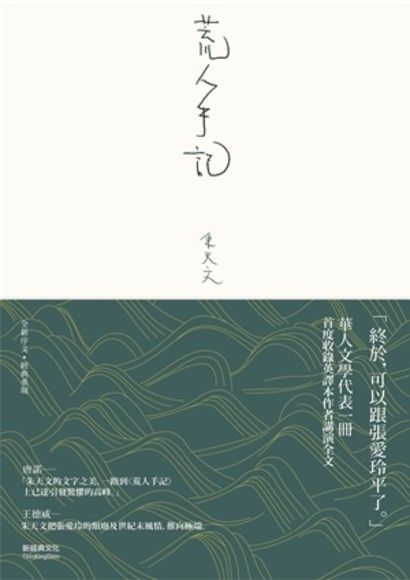
Of course, Chinese characters also have their advantages. Because each Chinese character has meaning and weight, it can create effects that other languages cannot, such as a kind of stickiness, or a kind of density of words. I think the most representative one is "Notes of a Wild Man", which is really dense in style. "Devil's Notes" has a Japanese version. After comparison, you will find that the text is doubled. The density of Chinese is very high, and when it is translated into Japanese, the density is bound to be diluted. Because Japanese must have pseudonyms and cannot use all Chinese characters, it is more difficult to write such a high-density style in Japanese.
Yang Jiaxian: Thank you. This involves a wide range, such as some emotions or sounds, how to express it simply and vividly? Or some new vocabulary, how to write it in your own language? This actually seems to have to go through a certain degree of time and process.
What I just immediately thought of was that about 100 years ago, there was a poet at that time, the well-known Hu Shi, who wanted to write the word we call "picnic" today, Picnic, but the translation of this word was not fixed at that time, and the poet did not know How to write it, I had to transliterate it in the end, and put it in a long poem of seven characters, put it in the ancient poetry style, and write it as "Pikenike came to the riverside". At first glance, I didn't even know what "picnic" was. You had to say it aloud before you might think of it as an English word. We read in 100 years later, and there will be a special interest. ●( The original text was first published on the OPENBOOK official website on 2022-07-10)
➤Speaking with literature as the identity, a complete profile
From Language, Gender to Ethnic Group | Amidst Multiple Vulnerabilities, Exploring Miracles to Live by | Creating a More Ideal Social Community
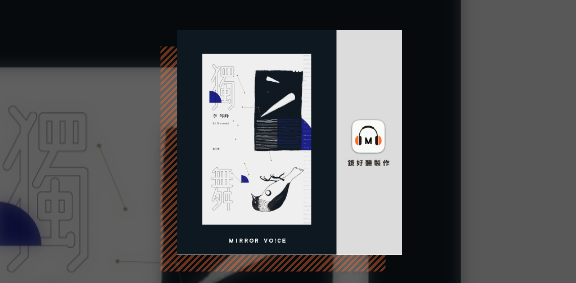
"I Grow in an Open Tree Hole" Audiobook
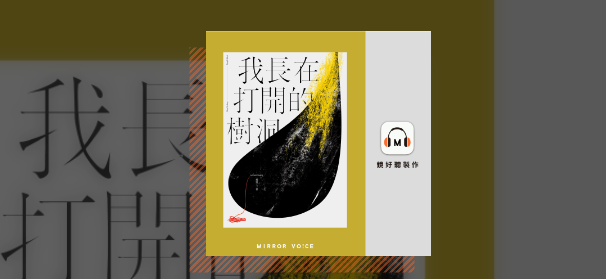
Like my work?
Don't forget to support or like, so I know you are with me..
Comment…